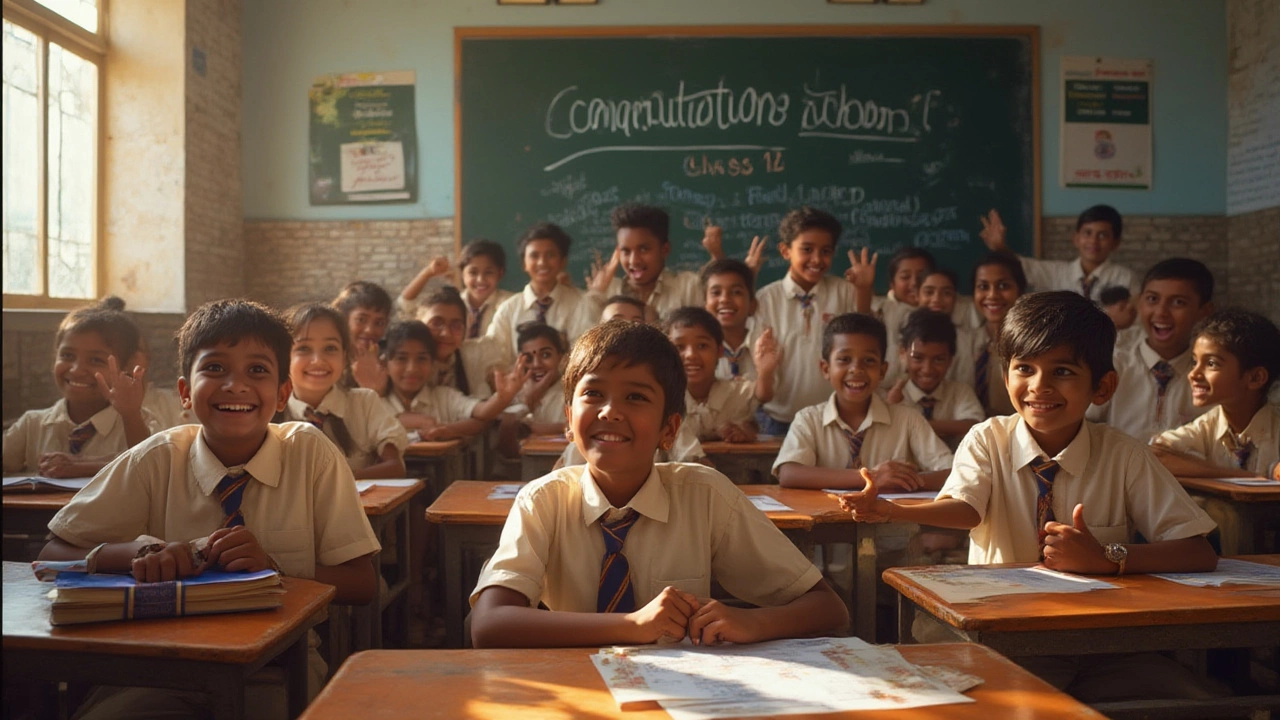Step into any family living room in India and you'll hear about “12th class” as if it's this mythical line in the sand. Parents stress over it, teens sweat it out, and even distant relatives seem to have an opinion on how you do in those fateful exams. But, here's the kicker: ask a dozen people, “What is a 12th class degree actually called?” and you'll get all sorts of answers. Some say 'PUC', others say 'HSC', a few call it 'Intermediate', and everyone seems convinced they're right. The truth is, the name changes with the state, the board, and sometimes even the school poster. So, if you're staring at your report card or just want to sound smarter at the dinner table, let's crack open the facts behind this famous milestone—the *12th class degree* in India.
The Real Name for 12th Class in India
If you've spent any time chasing admission forms, deadlines, or career advice in India, you'll know there isn't just one name for what people call the 12th class degree. Officially, there's no such thing as a '12th class degree'—what students earn after passing their final school exam is usually termed a 'certificate'. This certificate goes by different names depending on the school board.
For students under the Central Board of Secondary Education (CBSE)—which, by the way, has over 20,000 schools in India and even more abroad—the 12th standard is officially called the "Senior School Certificate Examination (SSCE)". Many just call it the "CBSE 12th certificate." It's the last school exam before college, and universities across India ask for your scores from these exams.
Now, flip to the Council for the Indian School Certificate Examinations (CISCE), which handles the Indian School Certificate (ISC) Exam. If you see someone mention "ISC" in their education history, they're referring to this 12th class completion from ICSE-affiliated schools. Again, same exam level, different board, different name.
The story shifts again if you live in states with their own education boards. For example, the Maharashtra State Board calls it the "Higher Secondary Certificate" or HSC. You'll see the same 'HSC' nomenclature in states like Tamil Nadu and Gujarat. Flip again to some northern states (think Uttar Pradesh, Andhra Pradesh, Telangana, Bihar), and 12th standard is often packaged as "Intermediate" or "Intermediate of Arts/Science/Commerce." Yep, even the abbreviation changes in every document.
So, you’ll hear these terms a lot for the 12th class qualification in India:
- Higher Secondary Certificate (HSC): Common in states with state education boards (like Maharashtra, Tamil Nadu, Gujarat, Kerala, and others).
- Senior Secondary Certificate or Senior School Certificate: Used by CBSE board schools.
- Indian School Certificate (ISC): The name for the CISCE board’s 12th exam result.
- Intermediate Certificate: Typical for states like Uttar Pradesh, Andhra Pradesh, Telangana, and Bihar.
Confusing? You bet. But here's a neat tip: in college admission forms or government job applications, you can safely use "Passed 10+2" or "Higher Secondary" and 99% of people will know what you mean. If someone's still confused, just say, "I completed my 12th." That’ll usually end the conversation.
| Board/State | Name of 12th Certificate | Common Abbreviation |
|---|---|---|
| CBSE | Senior School Certificate Examination | SSCE |
| CISCE | Indian School Certificate | ISC |
| Maharashtra, Gujarat, TN, Kerala, etc. | Higher Secondary Certificate | HSC |
| UP, Bihar, AP, Telangana | Intermediate Certificate | Intermediate |
One more thing: Don’t get tripped up when people call it “PUC” (Pre-University Course) in Karnataka. It's all the same—just India's unique language soup for the same finish line.

Why Is 12th Class So Important in India?
The reason everyone gets so worked up about the 12th class result isn't just family pressure—it's because this grade pretty much sets the stage for what you do next. It decides college admissions, eligibility for entrance tests like JEE, NEET, CLAT, or even getting through recruitment for police, railways, or bank jobs.
In fact, if you pick up any Indian competitive exam notification, there’s a high chance that they'll specify "must have passed 10+2". This isn't just about science or commerce. Even if you're picking vocational training, hotel management, or fields like graphic design, your 12th certificate is your all-access pass.
Here's something you probably didn't know: About 12.4 million kids took class 12 board exams just in 2024, according to recent government statistics. That's more than the entire population of Tokyo! No wonder the whole country holds its breath every April-May, waiting for those results to drop.
The choice of subjects in 12th class can shape your next decade. If you pick science (with or without mathematics), you keep medical and engineering doors open. Commerce can land you in business, accounting, or finance. Humanities can lead to careers in law, journalism, design, government, and more. Some boards even let you mix and match unusual combos (like Economics with Art), opening more left-field careers.
One really practical tip: Keep two or three photocopies of your 12th certificate ready. Pretty much everywhere you apply, you'll need to attach an attested photo copy. Some offices in India still love rubber stamps and signatures; you’d be surprised. Even Eliora, my daughter, grumbled about running to the notary when she started her applications.
You’ll also need your original 12th class marksheet for:
- Applying for Indian colleges and universities (central, state, or private)
- Sitting for most entrance exams (engineering, medical, law, design, etc.)
- Getting certain scholarships and fee waivers
- Job applications where “minimum qualification” is 12th pass
- Enrolling in diploma or certification courses
Heads-up: Many education boards now provide digital marksheets as well as the classic paper ones. The digital version is accepted for most online processes but always ask the college or office in case they still want the physical copy for verification.

What Happens After Completing 12th Class?
Completed the *12th class degree* and looking at a blank future? Relax, this is when most people feel the same way you do. Here's how things typically shake out after clearing the 12th in India:
- Undergraduate Courses: This is the most popular path. B.A., B.Sc., B.Com., BBA, B.Tech, MBBS—you name it, there’s probably a course. Each stream from your 12th can lead to different degrees. Pure science can land you in engineering or medicine, while commerce lines up for CA, BCom, BBA, or hotel management. Humanities branches out into journalism, law, psychology, and more.
- Diploma Courses: Tons of students opt for shorter, skill-based diplomas in fields like animation, fashion design, nursing, aviation, and photography. Government-run ITIs (Industrial Training Institutes) are popular for those interested in trades or technical work.
- Professional Exam Prep: Some use their 12th result to jump straight into prep for government jobs—SSC, railways, police, and more. Minimum qualification for lots of entry-level government roles is 12th class pass.
- Overseas Education: If you're aiming for international colleges, most require a 12th marksheet recognized by the Association of Indian Universities. A few might ask for extra English tests like IELTS or TOEFL.
- Drop year (Gap year): More common than you think; many students use this time to prepare for harder entrance exams like NEET or JEE, or just figure out what they want to do.
Interesting stat: According to the Ministry of Education, almost 18% of 12th pass students take a gap year, mainly to retake entrance exams or explore alternative career options. It’s no longer taboo or a sign of "failure" – just another option.
You should also know: There's no official 'degree' after 12th. Only after finishing a 3-year or 4-year college course (like B.Sc., BA, BCom, BTech, or MBBS) do you earn your first university degree. The 12th qualification is a certificate but calling it “degree” is a quirky Indianism that’s stuck over years. Most HR folks will understand what you mean if you write “12th degree” on your resume, but if you’re aiming for a job abroad—use "higher secondary certificate."
The 12th marksheet is also your ticket for government documents—such as applying for a driving licence (if you’re over 18), voter ID, or even getting your passport. It's pretty much the Swiss Army knife of Indian paperwork.
Still confused about what to do next? Here are pro tips:
- Check eligibility for the course or college you want. Each has its own rules for which board they accept and required subject combos.
- Don’t lose your original marksheet. Getting a duplicate can take weeks, sometimes months.
- If you're thinking study abroad, make sure your 12th certificate is recognized outside India. Most boards (CBSE, ISC, HSC) are, but always check.
- Want a government job early? Look for recruitment ads that mention “12th pass/open” or similar phrases—don’t wait for a college degree if work is your priority.
So there you have it. The 12th class isn’t the end—just the fork in the road with more signboards than you ever imagined. Different states, boards, and career dreams might call it something else, but that certificate’s your golden ticket wherever you want to go next. Just remember to keep the paperwork handy, never stress over the 'right term', and be ready to explain—because in India, even your qualification needs a translator.
